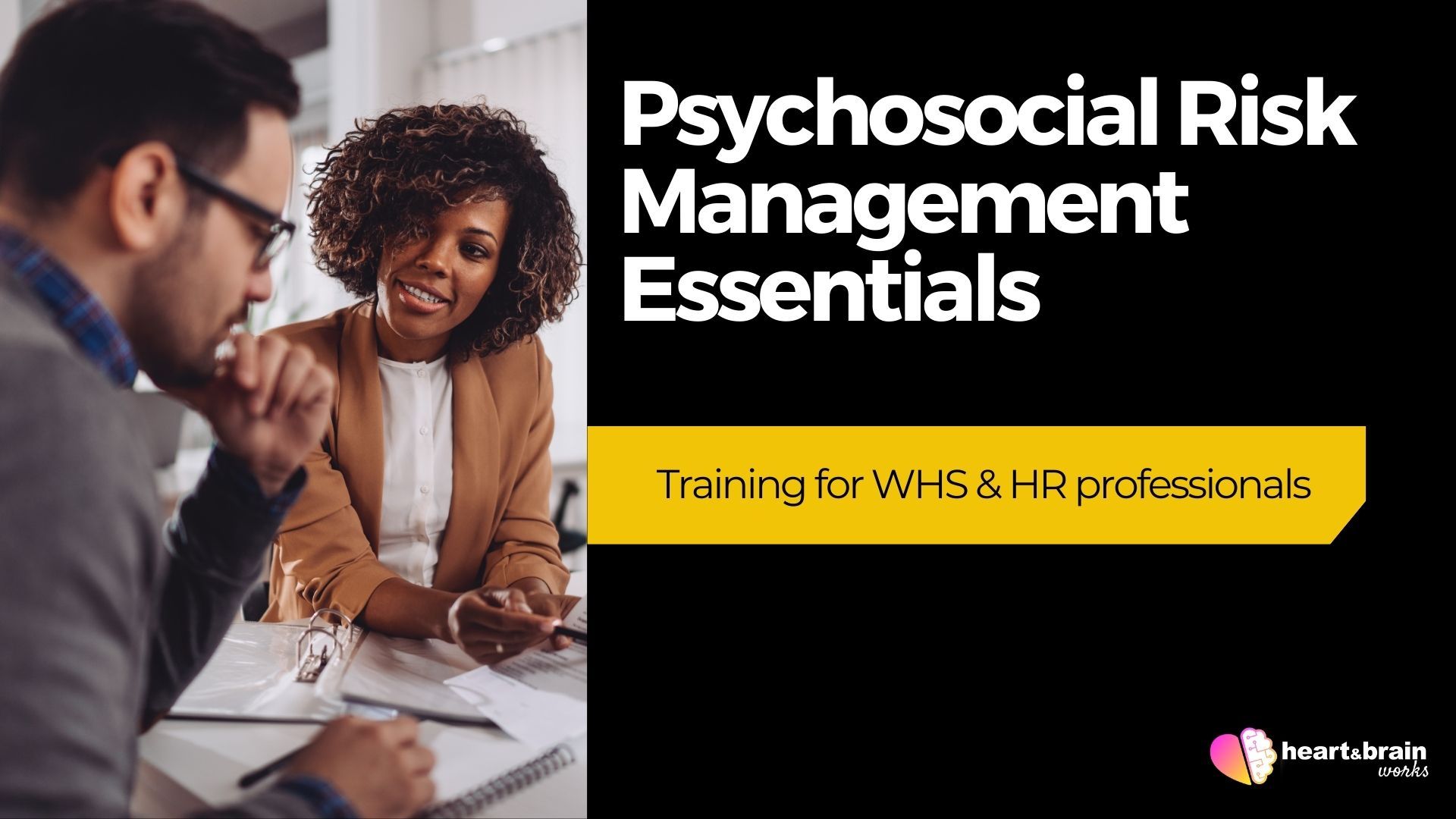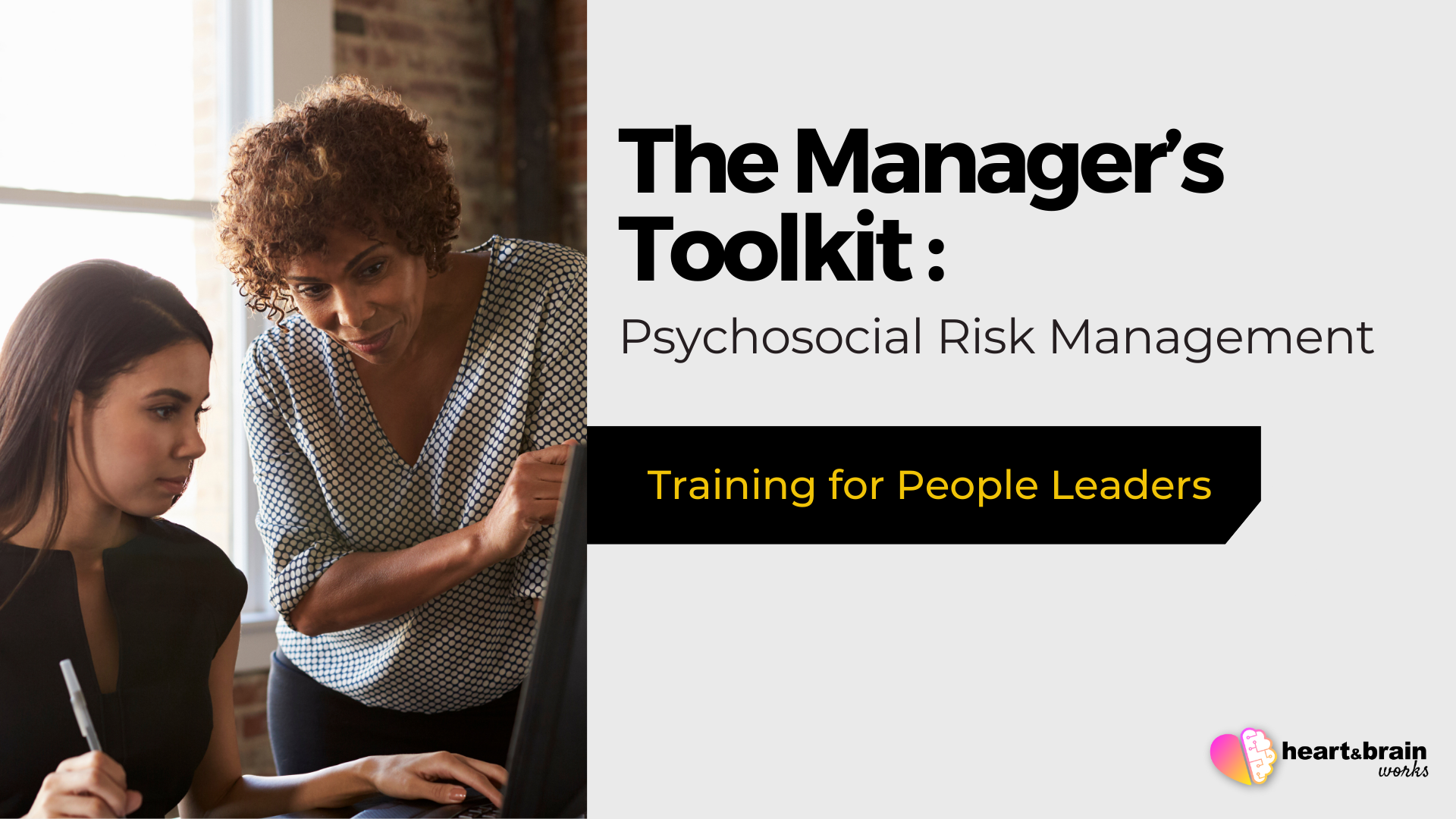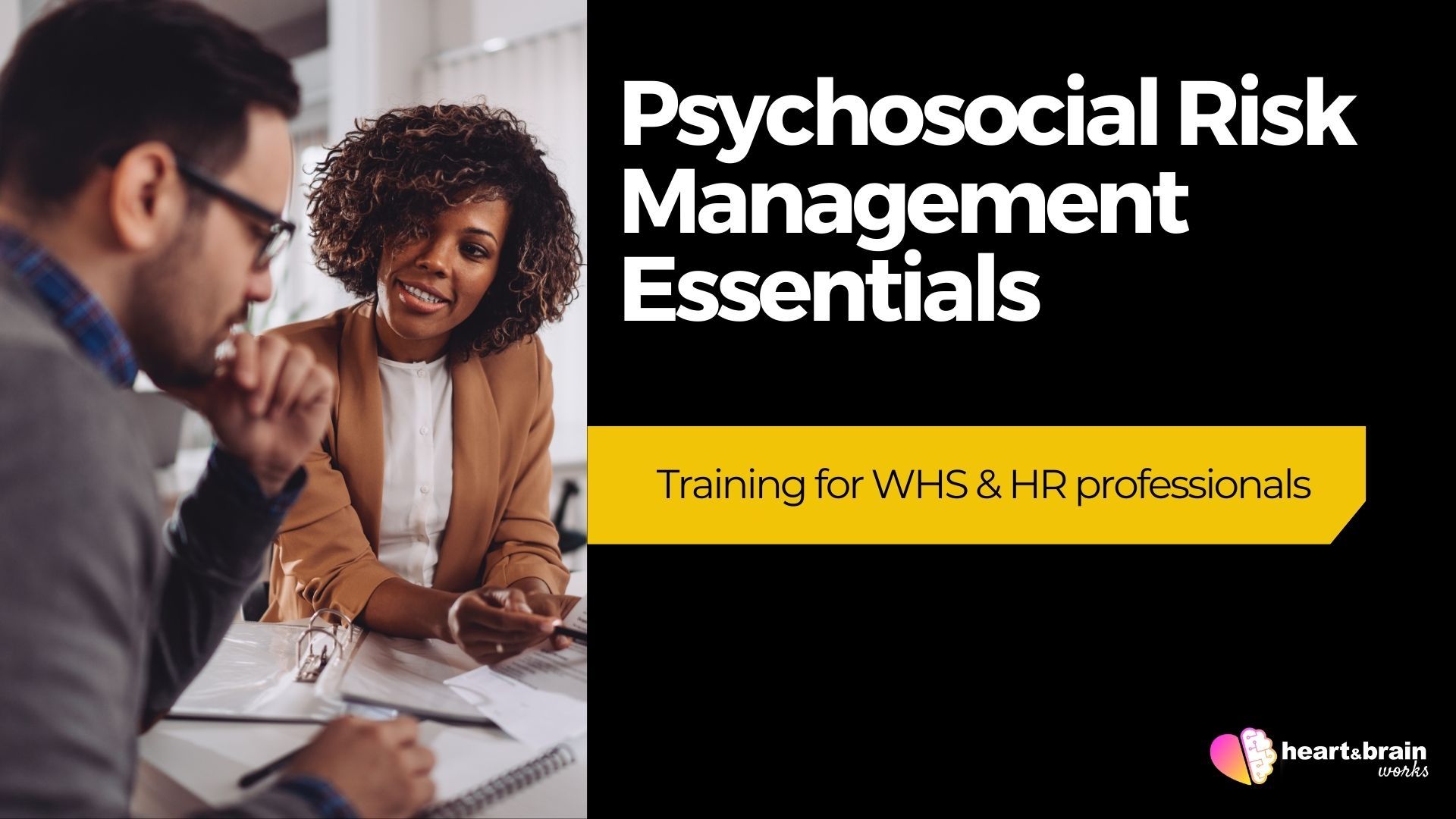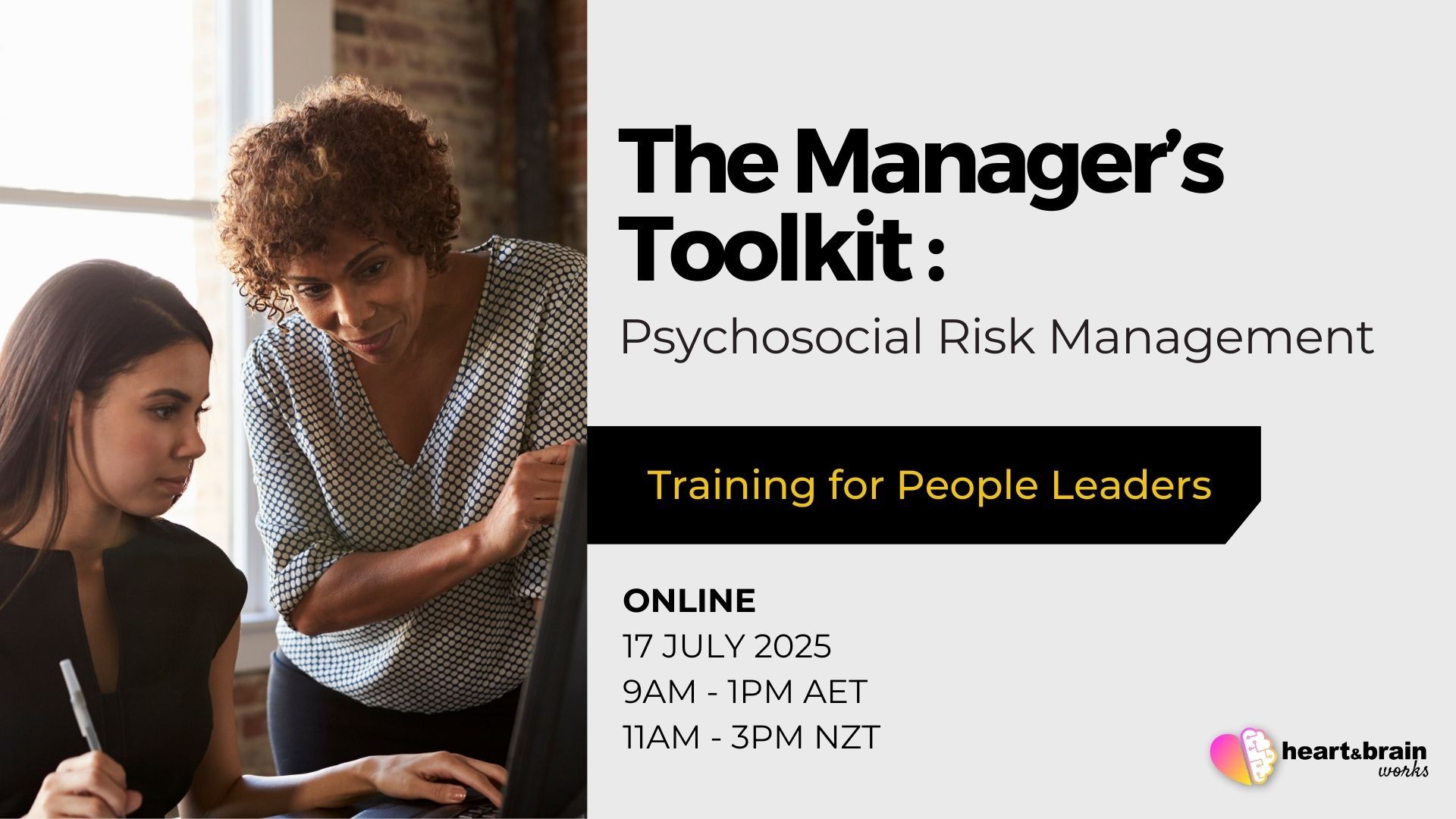Line Managers & Psychosocial Risk:
Why Their Role is Crucial – and Legally Required
Line managers are on the frontline of workplace mental health and psychosocial risk management — yet many are underprepared, overburdened, or unclear about what’s actually expected of them.
In this article, we unpack the role of line managers in psychosocial risk management, examine the regulatory and legal context in Australia and New Zealand, and share what the research and case law are telling us. You’ll also find practical tools and competencies that every manager should develop to support psychological health and safety at work.
We also go beyond psychosocial risk compliance to highlight the importance of manager support. Effective manager support not only enhances employee well-being but also significantly impacts organisational productivity and culture. Effective leadership and strong manager can reduce the adverse effects of high job demands, acting as a buffer against stress and psychosocial risks. Conversely, poor leadership and lack of support can become major sources of chronic stress and heightened psychosocial risk.
Why Line Managers Matter
Line managers make or break the employee experience. They’re responsible for:
-
Day-to-day work planning and task allocation
-
Managing team dynamics, workload and communication
-
Responding to signs of distress or conflict
-
Implementing controls to reduce risks
Manager behaviour and capability influence whether psychosocial hazards are recognised, escalated, and managed — or left to fester.
Research shows that for 69% of people, their manager has the greatest impact on their mental health — on par with their partner (The Workforce Institute, 2023).
Yet, our psychosocial risk audits show that line managers are disproportionately affected by high workload, cognitive load, and emotional demands — often without sufficient training or organisational support.
In this article we discuss:
- The role of line managers in psychosocial risk
- The Regulatory Landscape and Law Case Insights
- Manager support from a psychosocial risk perspective
- Key leadership qualities that impacted employees' psychological health and safety
- Essential competencies managers needed to support their teams effectively
The Role of Leaders in Psychosocial Risk Management
Officers’ Due Diligence
- Acquire and maintain knowledge of WHS matters
- Understand the nature of the PCBU's operations and associated hazards
- Ensure the PCBU has appropriate resources and processes to manage risks
- Ensure the PCBU has implemented procedures for complying with WHS laws
Line Managers
- Contribute to the management of psychosocial hazards, through various means including:
- Awareness and understanding of what psychosocial hazards are
- Regular 1:1 check-ins with reports
- Identification and reporting of hazards
- Implementation of controls to eliminate or reduce hazards as practicable
NOTE: Manager support can be a strong protective factor against the negative impact of psychosocial risk
The Regulatory Context
Psychosocial risk management is not just a best practice—it is a legal requirement. In recent years, the regulatory landscape across Australia has evolved rapidly to reflect the seriousness of psychological health in the workplace.
Key legislation and guidance include:
- WHS Act & Regulations / OHS Act
- Code of Practice: Managing Psychosocial Hazards at Work
- Upcoming Victoria legislation: The Occupational Health and Safety Amendment (Psychological Health) will come into effect on 1 December 2025, introducing specific duties for employers to manage psychosocial risk
These frameworks place a joint responsibility on both employers and employees to manage psychosocial hazards. Employers are expected to identify, assess, and control risks. Employees are required to take reasonable care for their own and others' psychological health and safety, as well as report identified hazards and comply with control measures.
Other relevant legislation includes:
- Sex Discrimination Act 1984 and Anti-Discrimination Act 1977 – covering sexual harassment and workplace discrimination
- Model Code of Practice on Sexual and Gender-Based Harassment – offering practical guidance for prevention and response
- Fair Work Act 2009 – includes provisions on adverse action and workplace rights relevant to some psychosocial hazards such as bullying for example
- Industrial Manslaughter Offence – highlighting the role of officers
A PCBU Responsibilities
A PCBU must:
- identify reasonably foreseeable psychosocial hazards that could give rise to health and safety risks
- introduce, maintain and review control measures to eliminate (or minimise) psychosocial risks to health and safety so far as is reasonably practicable
Case Law Insights
These real-world legal cases illustrate how failures to manage psychosocial hazards can lead to serious consequences. These insights highlight the importance of proactive leadership, compliance with WHS duties, and the organisational systems needed to protect psychological health at work.
Mathews v Winslow Constructors
$ 1.3millionAUD
Psych hazards:
- Bullying
- Sexual Harassment
- Trauma
- Exposure to violence
Court Services Victoria
$ 379,157AUD
Psych hazards:
- Toxic culture
- High job demands
- Exposure to Traumatic materials
- Role conflict
- Poor workplace relationships
- Offensive behaviours
Elisha v Vision Australia
Nearly $ 1.5millionAUD
- Psychiatric injury resulting from breach of employment contract
- Increased liability for employers
- Procedural fairness
- “pattern or behaviour” not addressed in a timely manner
Line Manager Preparedness Quiz
To assess the effectiveness of your line managers in managing psychosocial risks, consider the following questions:
- Do my managers understand well what psychosocial hazards are and why it is important to manage them?
- Are my managers good at identifying signs of stress?
- Are my managers good at having stress and mental health-related conversations with staff?
- Are my managers well equipped to put in place controls that promote psychosocial safety?
- Do my managers have enough support and resources to effectively manage psychosocial risk?
The more "no" answers, the higher the likelihood you managers could benefit from training in psychosocial risk management.
Manager Support
The role of managers in psychosocial risk management extends well beyond legal compliance. Managers are not just executors of policy—they are protectors of psychological health.
Good manager support can act as a protective factor, buffering teams against stress, burnout, and the negative impact of high job demands. In contrast, poor leadership and lack of support are well-documented contributors to chronic stress and heightened psychosocial risks.
Manager support encompasses two main dimensions: emotional and instrumental support.
Emotional Support
This involves empathy, active listening, and demonstrating genuine care for employees.
Instrumental Support
This includes providing actionable assistance or advice and implementing accommodations when necessary.
Understanding these dimensions helps organisations and managers create a supportive environment where employees feel valued and understood.
Source: Karatepe, O. M., & Kilic, H. (2015). Does Manager Support Reduce the Effect of Work–Family Conflict on Emotional Exhaustion and Turnover Intentions? Journal of Human Resources in Hospitality & Tourism, 14(3), 267–289.
From a psychosocial risk perspective, Manager Support is a Job resource.

The Impact of Manager Support
Manager support is a critical job resource and a psychosocial protective factor. Research highlights its significant impact on employee well-being and organisational outcomes:
Mental Health Impact
For 69% of people, managers had the greatest impact on their mental health, on par with their partner.
Source: The Workforce Institute at UKG (2023). Mental Health at Work – Managers and Money
Mitigating Work-Life Conflict
Manager support can mitigate the negative impact of work-life conflict and reduce turnover intentions
Source: Karatepe, O. M., & Kilic, H. (2015). Does Manager Support Reduce the Effect of Work–Family Conflict on Emotional Exhaustion and Turnover Intentions? Journal of Human Resources in Hospitality & Tourism, 14(3), 267–289.
Reducing Emotional Exhaustion
Manager support can reduce emotional exhaustion and poor wellbeing caused by high job demands in lean settings
Source: Huo, M.-L., Boxall, P., & Cheung, G. W. (2022). Lean production, work intensification and employee wellbeing: Can line-manager support make a difference? Economic and Industrial Democracy, 43(1), 198–220.
Enhancing Well-being
Manager support and the perceived importance management places upon mental health issues had a positive effect on employee mental health in Australian emergency services, even for those employees with a mental disorder
Source: Petrie, K., Gayed, A., Bryan, B. T., Deady, M., Madan, I., Savic, A., Wooldridge, Z., Counson, I., Calvo, R. A., Glozier, N., & Harvey, S. B. (2018). The importance of manager support for the mental health and well-being of ambulance personnel. PLOS ONE, 13(5), e0197802.
Manager Competencies
Effective psychosocial risk management as well as good manager support require specific competencies.
Two frameworks outline these competencies in more detail:
Framework 1. Competencies for Good Manager Support
Petrie et al. (2018)
My line manager:
1. pays attention to my feelings and problems, and notices if I’m not feeling well.
2. shows that they appreciate the way I do my job.
3. helps me with a certain task if necessary.
4. gives me advice on how to handle things if necessary.
5. would be someone I would speak to if I was experiencing workplace stress.
6. is considerate when managing team members.
7. involves me in decision-making.
8. is accessible and approachable to people in the team.
9. remains objective when an issue between staff members arise.
Framework 2. Competencies for Psychosocial Risk Management
Heart Brain Works framework
My line manager:
1. understands what psychosocial hazards are and how they impact mental health
2. understands when the risk of compensation claims/stress leave arises and how to mitigate it
3. identifies the signs of stress and poor mental health in staff and in themselves
4. has effective and regular conversations with staff about psychosocial hazards and mental health
5. sets in place appropriate controls and interventions to manage workplace stress
6. puts in place appropriate measure to manage one’s own mental health
7. understands the support available in the organisation, makes use of it and shares it with staff
8. enacts positive behaviours that promote psychological health and safety




